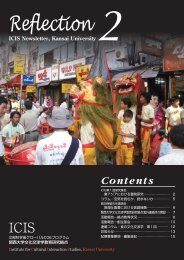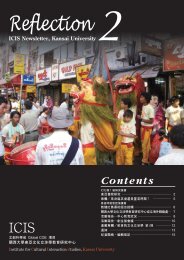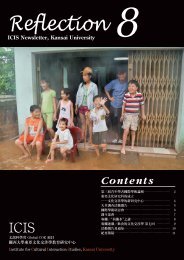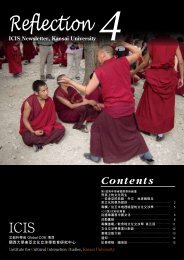English
English
English
You also want an ePaper? Increase the reach of your titles
YUMPU automatically turns print PDFs into web optimized ePapers that Google loves.
ICIS Newsletter, Kansai University<br />
Amakusa as the Sea – From the experience of the fieldwork<br />
ZOU Shuangshuang(COE–RA)<br />
The word, “Amakusa” sounds so nice to me. When I first heard this<br />
unfamiliar word, I associated the sound “ama” with “ 甘 (sweet)”<br />
rather than “ 天 (sky, heaven)”. As the phrase “ 天 の 草 (grass of the<br />
sky)” does not really make sense, “ 甘 い 草 (sweet grass)” somehow<br />
came to my mind first because its meaning sounded rather clear.<br />
Nevertheless, the real Amakusa as a place is far from what can be<br />
expressed with the simple Chinese character “ 甘 ”. I discovered this<br />
when I went there with the<br />
professors and classmates<br />
for the fieldwork in July. It<br />
was my first encounter with<br />
the lively town of Amakusa,<br />
which turned out to be<br />
absolutely different from<br />
what I had read about.<br />
Interview with Mr. Tabata Sumio<br />
Amakusa is quiet. The<br />
vast rural landscape in<br />
front of my eyes made me feel like taking a deep breath and forgetting<br />
busy everyday life. Even in Hondo, the central area where the town<br />
hall of Amakusa is located, no one was on the streets after 9 pm. On<br />
the first day, some people who are used to the busy night in Osaka<br />
complained about its inconvenience. From the second day onwards,<br />
however, I heard no complaints at all. Instead, what I heard was the<br />
breathing of the sea and an invitation from the sea breeze, as well as<br />
our chorus of pleasure in responding to them. Like myself, many of<br />
the international students are rarely able to experience the sea so<br />
closely. I can still vividly recall the exciting and moving moment<br />
when I took the first step into the sea. As the fieldwork progressed,<br />
we deepened our understanding of Amakusa. And as this process<br />
continued, it became clear that the “sea” was perfectly suited to<br />
Amakusa.<br />
On second thought, Amakusa is the sea itself. The sea supports the<br />
life of the inhabitants of Amakusa, as well as the international<br />
exchange. As the history of Amakusa is highly connected with the sea,<br />
the characteristics of the sea have also taken root in the Amakusa<br />
Islands. The sea tolerates everything, so the people there welcomed us<br />
warmly and actively supported our fieldwork. The sea can move<br />
anywhere, so the daughters of Amakusa went everywhere, even abroad,<br />
to work to support their households. As the waves of the sea often stay<br />
calm but sometimes get rough, the people of Amakusa once in a while,<br />
during hard times, rose in revolt to bravely oppose the oppression.<br />
Moreover, like the sea which guards immeasurable treasures, Amakusa<br />
also possesses an incredible amount of “treasures” in the form of<br />
undiscovered historical materials. The old documents from several<br />
hundred years ago, kept and passed on by the local people, impressed<br />
on us the sorrows and pleasures of the people who lived in Amakusa at<br />
that time. We were overwhelmed by their powerful life force. While<br />
we were carefully turning the pages of the documents looking at the<br />
photography, our fingers could not help but quiver. We knew we must<br />
not disgrace the dignity of the documents which represented the<br />
collective memories of Amakusa. Of course, the most unforgettable of<br />
all was the mysteriousness of Amakusa fostered by the sea: Mother<br />
Mary-Guanyin (マリア 観 音 ), the secretly engraved crosses that were<br />
everywhere, or Oratio (オラショ)reciting in the dim secret room. It<br />
seemed that the true strength of the Amakusa people might be the<br />
illumination generated in their hearts when physical light had not been<br />
allowed.<br />
In the same way that the sea cannot be expressed with the Chinese<br />
character “ 鹹 (salty)”, a single Chinese character, “ 甘 (sweet)”, will<br />
never be enough to represent Amakusa. We met Amakusa in July, just<br />
as Orihime and Hikoboshi meet only once a year during Tanabata. We<br />
are very much looking forward to our next meeting, expecting that<br />
Amakusa will show us some of its other flavors.<br />
Christian cemetery, Hondo, Amakusa-city<br />
3












